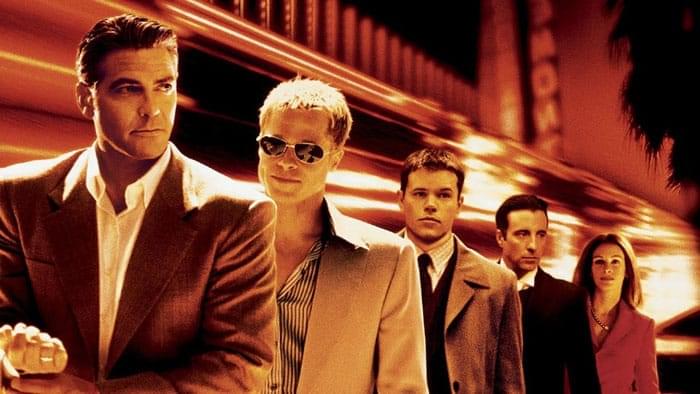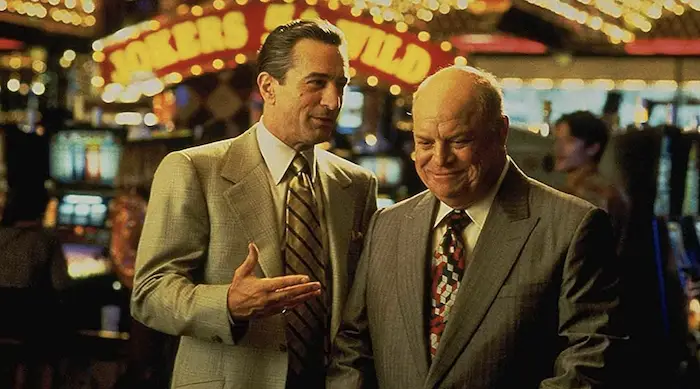
Casino heist films have long captivated audiences with suspense, action, and elaborate schemes. These movies delve into the psychology of risk, exploring why people are drawn to high-stakes gambling and crime. From carefully orchestrated plans to tales of greed and downfall, these films reveal much about the thrill and dangers of risk-taking. Here’s a look at iconic casino heist films and the insights they offer on human behavior.

Ocean’s Eleven (2001): The Art of Calculated Risk
Steven Soderbergh’s Ocean’s Eleven is a quintessential heist movie following Danny Ocean and his handpicked crew as they attempt to rob three major Las Vegas casinos in one night. Each team member has a unique skill, underscoring the value of detailed planning, teamwork, and precision. While the thrill lies in the complexity of their heist, the team knows the stakes are high, and failure is always a looming threat.
The film highlights calculated risk—every move is measured to optimize success and reduce potential disaster. This appeals to those who enjoy strategic gambling, emphasizing careful assessment and controlled stakes. Yet, despite all the planning, Ocean’s Eleven reminds us that not all factors can be controlled, and risk always carries a price.

Casino (1995): The Dark Side of Gambling
Martin Scorsese’s Casino provides a much bleaker view of the gambling world. Centered on the life of Sam “Ace” Rothstein, a casino operator with an almost obsessive dedication to odds and control, the story explores themes of addiction, power, and the moral cost of excess. Rothstein’s pursuit of power, wealth, and control eventually leads to betrayal and self-destruction, revealing the danger of unchecked greed.
This film portrays the allure and subsequent entrapment of gambling addiction. Casino shows how, for some, the thrill of risk morphs into an uncontrollable compulsion, leading to reckless actions and severe personal consequences. By exploring the darker aspects of risk, Casino serves as a cautionary tale about the high costs of gambling addiction and the importance of knowing when to walk away. For more information and trailers, you can visit IMDb.

Now You See Me (2013): The Illusion of Control
Now You See Me adds magic to the typical heist genre. The Four Horsemen, a team of illusionists, use their skills to execute seemingly impossible heists, manipulating the audience’s perception and creating an illusion of control.
The concept of “illusory control” is evident here, where people mistakenly believe they have more control over outcomes than they actually do. In real-life gambling, this phenomenon is common, with players believing they influence results, leading to overconfidence and often to losses. Now You See Me suggests that risk and control are subjective, and even the best-laid plans are vulnerable to unforeseen factors.
The Psychology of Risk and Reward
The appeal of casino heist films goes beyond the excitement of the heist itself—it taps into the human fascination with risk and reward. Research in psychology shows that risky activities activate the brain’s reward system, releasing dopamine, a neurotransmitter that creates a sense of pleasure. This dopamine-driven “high” is particularly powerful in gambling, where the uncertainty of winning or losing intensifies the thrill.
The psychology behind risk-taking also involves “near-miss” scenarios, which are almost as rewarding as actual wins. This helps explain why people continue to gamble even after repeated losses. Heist films illustrate this dynamic, where characters often risk everything for a shot at wealth, power, or status. While casino heist films romanticize this thrill, it’s crucial to understand how easily people can become trapped by the allure of high-risk, high-reward activities.
Responsible Gambling: A Real-Life Perspective
While casino heist films emphasize the excitement of risk, real-life gambling is best approached with caution. Responsible gambling is about setting limits and not betting more than one can afford to lose. For some, online casinos offer a safe and regulated way to enjoy gaming from home. Platforms like CasinoBonusCA provide reviews to help users choose trustworthy sites and set boundaries for responsible gaming.
Conclusion
Casino heist films offer thrilling narratives that explore the allure and danger of high-stakes risk-taking. From the cool-headed planning of Ocean’s Eleven to the harsh realities of addiction in Casino, these films reflect the complex relationship humans have with risk and reward. By examining the psychology behind these thrilling stories, we gain insight into the risks that entertain us and the importance of making responsible choices in real life. Whether on screen or in real life, the excitement of the game is best enjoyed when we keep the stakes in perspective.
